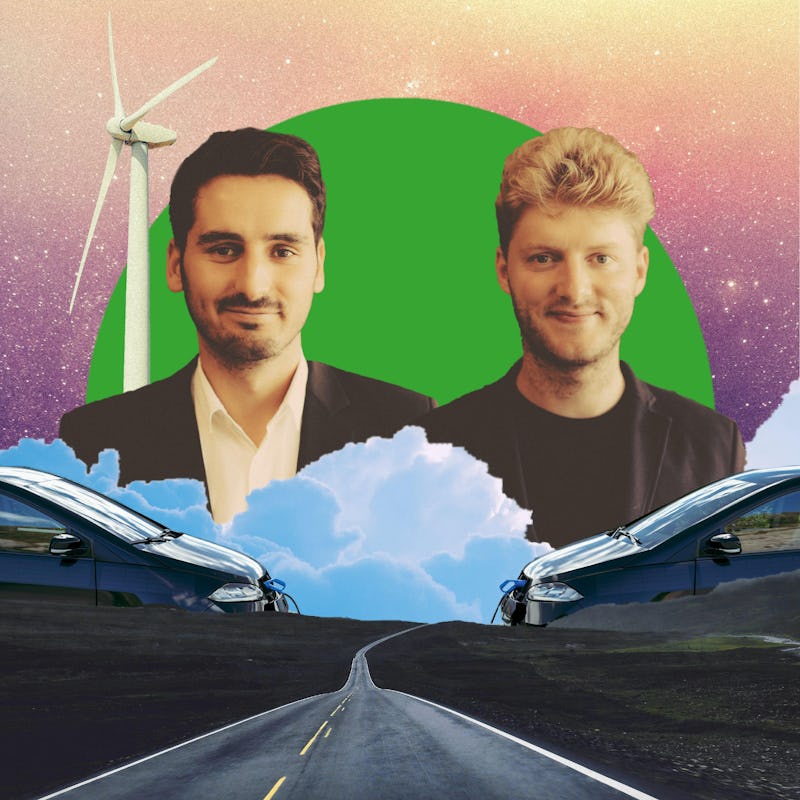With 10,000 preorders, Sono Motors wants to make solar cars the norm
"Where do we want to go? Where every car on the street you see is shared and is electric."

Laurin Hahn and Jona Christians are lifelong friends and founders of Sono Motors, a Munich-based car company that intends to change driving with electric, shareable cars. Sono’s first model, the Sion, goes into production at a Swedish factory in the second half of 2020. In the following op-ed, edited for clarity and brevity by Inverse, Sono’s founders share their vision for the future of transportation.
Hahn and Christians are members of the Inverse Future 50.
Laurin: Where do we want to go? Where every car on the street you see is shared and is electric. And that means you have to radically think of a new way of ownership, of driving, of the space in the city. It will happen. We will have autonomous driving and shared mobility.
You probably won’t own a car if you live in a city bigger than one million inhabitants. Space in cities is rare. The way we have to go is more space for the people, buildings, and infrastructure.
"The way we have to go is more space for the people, buildings, and infrastructure.
If you look at the car, it’s very inefficient. It takes a lot of space, and it’s just standing there 23 hours a day. So we have to think about it in a more efficient way.
We’re launching goSono, which is the app we’ve developed. And this means that’s not only Sion in there, it’s also other means of transportation. You will have an app where you put in your destination, and it shows you different types of mobility, just to go from A to B. All electric and all shared. This is the way we have to go.
See also: How two lifelong friends want to change the future of driving
Jona Christians (left) and Laurin Hahn (right) are the co-founders of Sono Motors.
Jona: I strongly believe that we, as a species, need to think much more holistically in the future. I’ll give you three examples that you can find already at Sono Motors, but that we have to look into more as a society.
First, we always talk about electric cars, producing the power, and charging the cars as three separate things. But they aren’t. That’s why we developed our bidirectional charging feature.
"We will never get to a fully sustainable world and society if we don’t think holistically.
In the future, when we have much more renewables in the grid, we have to have a buffer. And if we have all these cars on the street, and every car has, like our car, 35 kilowatt-hours or more capacity in the batteries, if they are just standing around, that is a complete waste! We will never get to a fully sustainable world and society if we don’t think holistically.
We have to think about electric cars and producing renewable powers as one. We have to say, ‘OK, we have to connect these cars.’
And I can tell with our cars, the total volume is about 260,000 cars, which is a fraction of the overall yearly production — 80 million. But when you think about it, all these cars would replace two nuclear power plants.
“Our car can never stay parked outside and run out of battery. It will never happen!”
Second, when we talk about shared mobility, a lot of people then say, ‘Yeah, well, we have new robo-taxis, or we have autonomous vehicles.’ And is that is true, that’s coming. But at the same time, we have cars already on the street. Just throwing them away is not the solution. We have to integrate them into the sharing system. We have to have a connection between fleet-operated sharing vehicles and private-owned sharing vehicles.
"We have 10,000 customers that have already reserved the Sion
And that’s exactly what we’re doing with our cars. We have 10,000 customers that have already reserved the Sion, and all these cars that will go to these private persons will have the sharing capacity already in them. If you’re on vacation for two weeks, you can share your car as if it were in the fleet. Then you have the connection, you have the holistic view.
Finally, when we talk about autonomous vehicles we also have to talk about autarky, or economic independence, for producing your own power. That’s why we integrate solar energy, because our car can never stay parked outside and run out of battery — it will never happen! It will be charged enough to drive to the next charging station. We have to have this. We have to have to see this in connection.
That is my view on the future. We have to think realistically about resources. Resources are limited, and we have to get that.
See also: How two lifelong friends want to change the future of driving